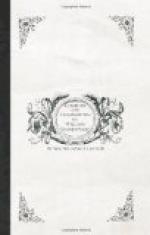“Sir, to my mortification I must confess that I took to myself the counsel he was giving to another; a young gentleman who, from his pale face, his abstinence at table, his cough, his taciturnity, and his gentleness, seemed already more than half poet. To him did Doctor Glaston urge, with all his zeal and judgment, many arguments against the vocation; telling him that, even in college, he had few applauders, being the first, and not the second or third, who always are more fortunate; reminding him that he must solicit and obtain much interest with men of rank and quality, before he could expect their favour; and that without it the vein chilled, the nerve relaxed, and the poet was left at next door to the bellman. ’In the coldness of the world,’ said he, ’in the absence of ready friends and adherents, to light thee upstairs to the richly tapestried chamber of the muses, thy spirits will abandon thee, thy heart will sicken and swell within thee; overladen, thou wilt make, O Ethelbert! a slow and painful progress, and ere the door open, sink. Praise giveth weight unto the wanting, and happiness giveth elasticity unto the heavy. As the mightiest streams of the unexplored world, America, run languidly in the night, {159a} and await the sun on high to contend with him in strength and grandeur, so doth genius halt and pause in the thraldom of outspread darkness, and move onward with all his vigour then only when creative light and jubilant warmth surround him.’
“Ethelbert coughed faintly; a tinge of red, the size of a rose-bud, coloured the middle of his cheek; and yet he seemed not to be pained by the reproof. He looked fondly and affectionately at his teacher, who thus proceeded:
“’My dear youth, do not carry the stone of Sisyphus on thy shoulder to pave the way to disappointment. If thou writest but indifferent poetry none will envy thee, and some will praise thee; but nature, in her malignity, hath denied unto thee a capacity for the enjoyment of such praise. In this she hath been kinder to most others than to thee; we know wherein she hath been kinder to thee than to most others. If thou writest good poetry many will call it flat, many will call it obscure, many will call it inharmonious; and some of these will speak as they think; for, as in giving a feast to great numbers, it is easier to possess the wine than to procure the cups, so happens it in poetry; thou hast the beverage of thy own growth, but canst not find the recipients. What is simple and elegant to thee and me, to many an honest man is flat and sterile; what to us is an innocently sly allusion, to as worthy a one as either of us is dull obscurity; and that moreover which swims upon our brain, and which throbs against our temples, and which we delight in sounding to ourselves when the voice has done with it, touches their ear, and awakens no harmony in any cell of it. Rivals will run up to thee and call thee a plagiary, and, rather than that proof should be wanting, similar words to some of thine will be thrown in thy teeth out of Leviticus and Deuteronomy.




